Track
You might find, when working in Excel, that you need to express square units (m²), exponents in math (2³), ordinal numbers (1st), footnotes, and trademark symbols (™ and ®). But, unlike Microsoft Word, where you can use a simple button on the toolbar, applying superscripts in Excel requires a little more effort. Don't worry. In this article, I'll show you all the best workarounds.
Before I show you the methods, I want to mention something important: Superscript in Excel is purely visual; it does not alter the actual value in the formula bar or impact any calculations.
Now, to make this easier to follow, I have divided this guide into two parts: One focused on formatting numbers and the other on text. Feel free to skip ahead to the section most relevant to what you need to accomplish. Then, remember to circle back to our Excel Fundamentals skill track to keep learning.
Superscripting Text in Excel
Excel allows you to apply superscript in text using the following methods:
Format Cells dialog method
To apply superscript formatting to text in Excel using this method:
- Select the cell containing the text you want to format
- Double-click the cell or press F2 to enter edit mode
- Highlight only the specific characters you want to superscript
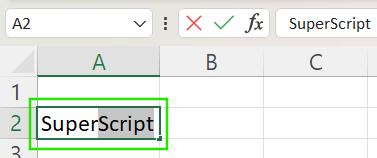
- Press Ctrl + 1 to open the Format Cells dialog box
- In the Font tab, check the "Superscript" box under the Effects section
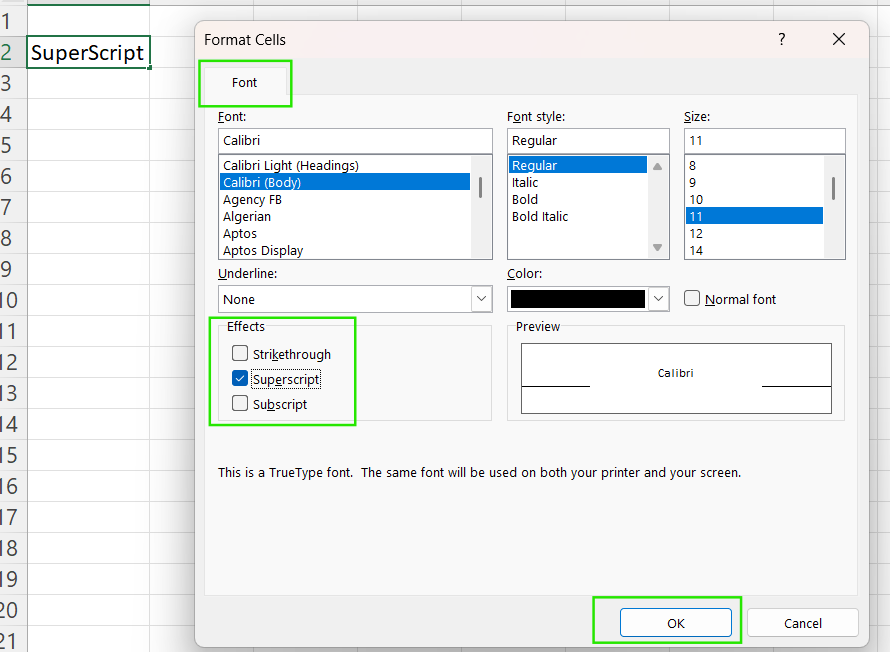
- Click OK to apply the formatting.
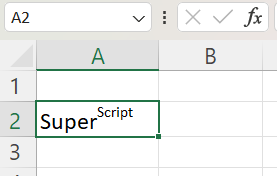
Keyboard shortcut path
Although Excel does not have a dedicated shortcut for superscripting, you can use a fast keystroke path:
- Select the text you want to format in edit mode
- Press Ctrl + 1 to open the Format Cells dialog box
- Press Alt + E to select the Superscript option
- Press Enter to apply the formatting and close the dialog
Note that this sequence of keystrokes is not a true shortcut but provides a faster way to navigate the Format Cells dialog without using your mouse.
Adding Superscript to the Quick Access Toolbar
To make superscripting more accessible, you can add it to the Quick Access Toolbar using the following steps:
- Go to File → Options
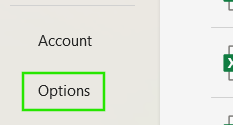
- On the Quick Access Toolbar, under Choose commands from: select Commands Not in the Ribbon or Popular Commands.
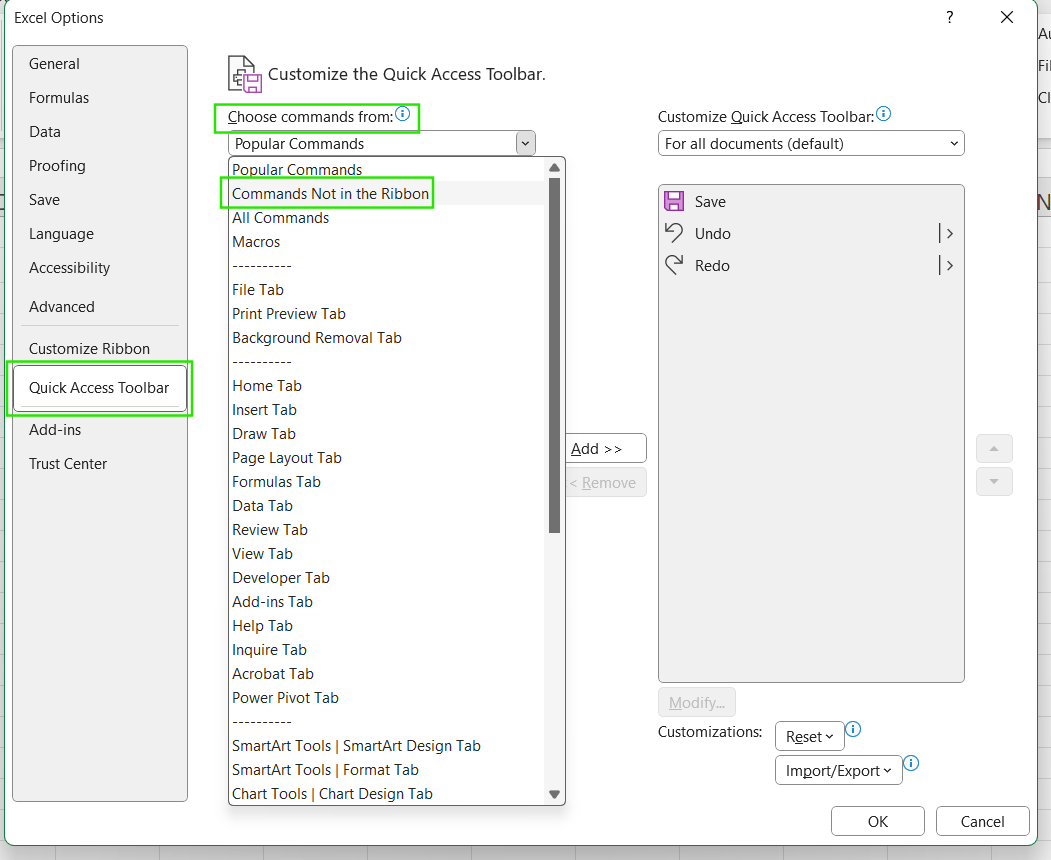
- Find Superscript, click Add, and hit OK.
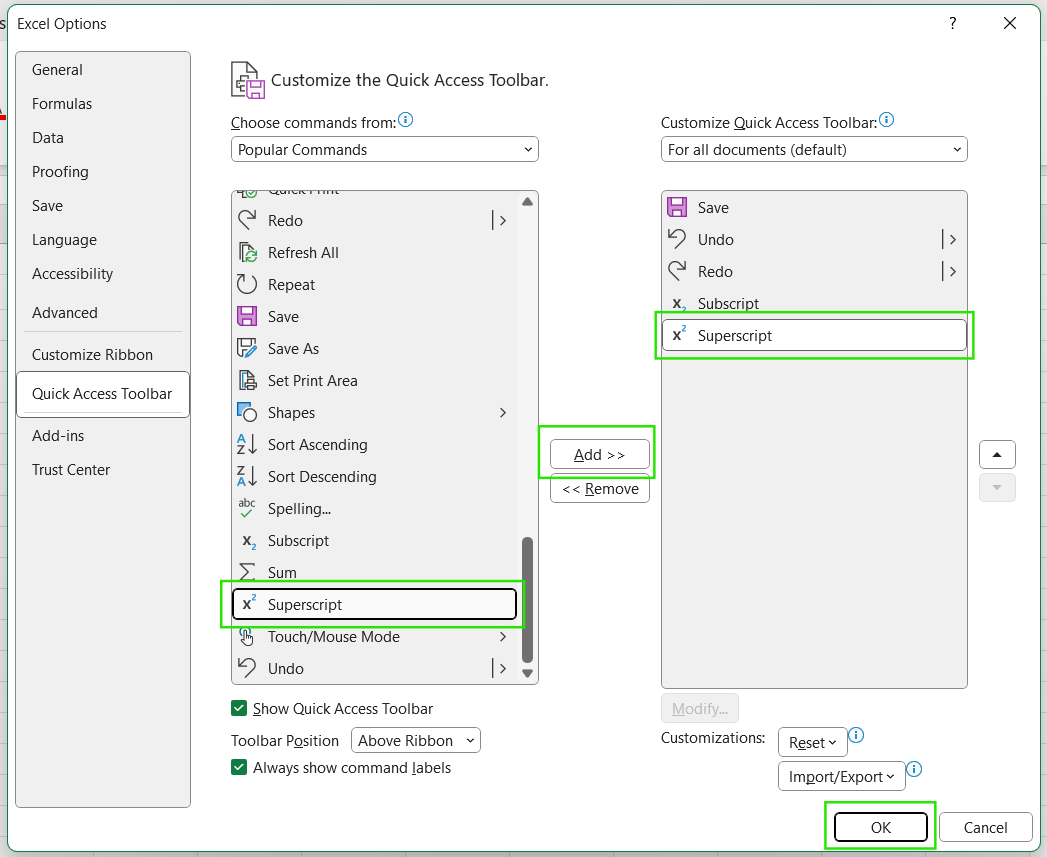
Once added, you can access superscript with a single click or by pressing Alt followed by the command's position number in your QAT. For example, press Alt + 5 if it's the fifth command.
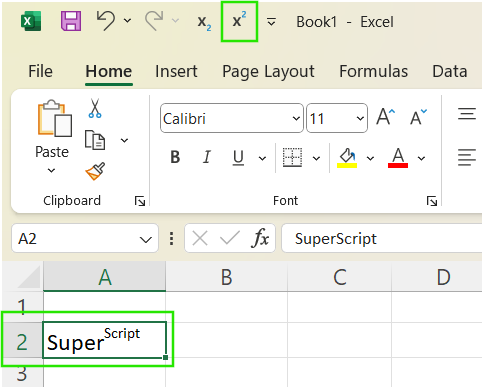
Adding Superscript to the Excel Ribbon
You can also make superscript available in the Ribbon using these steps:
- Right-click anywhere on the ribbon and select Customize the Ribbon
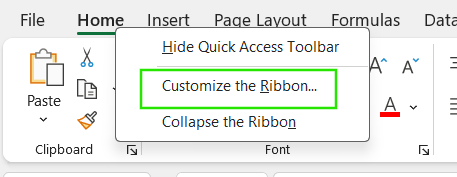
- Under Main Tabs on the right side, select the tab where you want to add superscript.
- Click New Group to create a custom group.
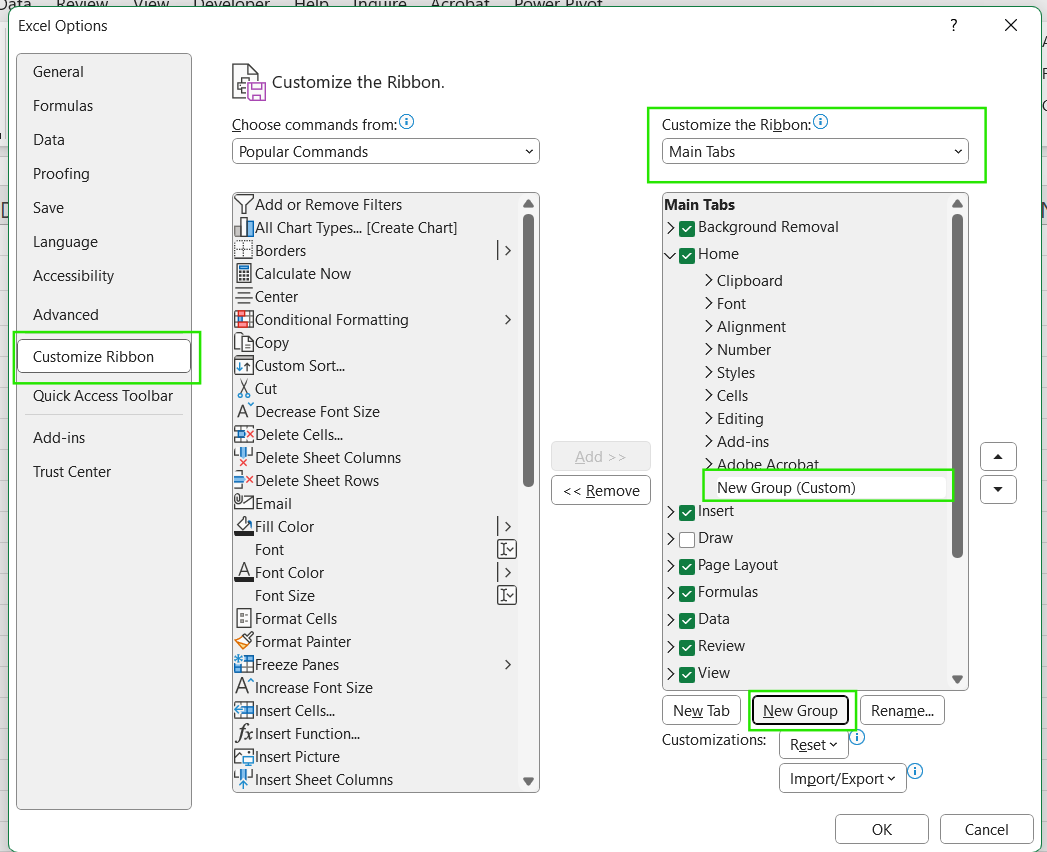
- With your new group selected, go to the Choose commands from dropdown, select Commands Not in the Ribbon or Popular Commands.
- Find Superscript in the list and click Add. Click OK to save your changes.
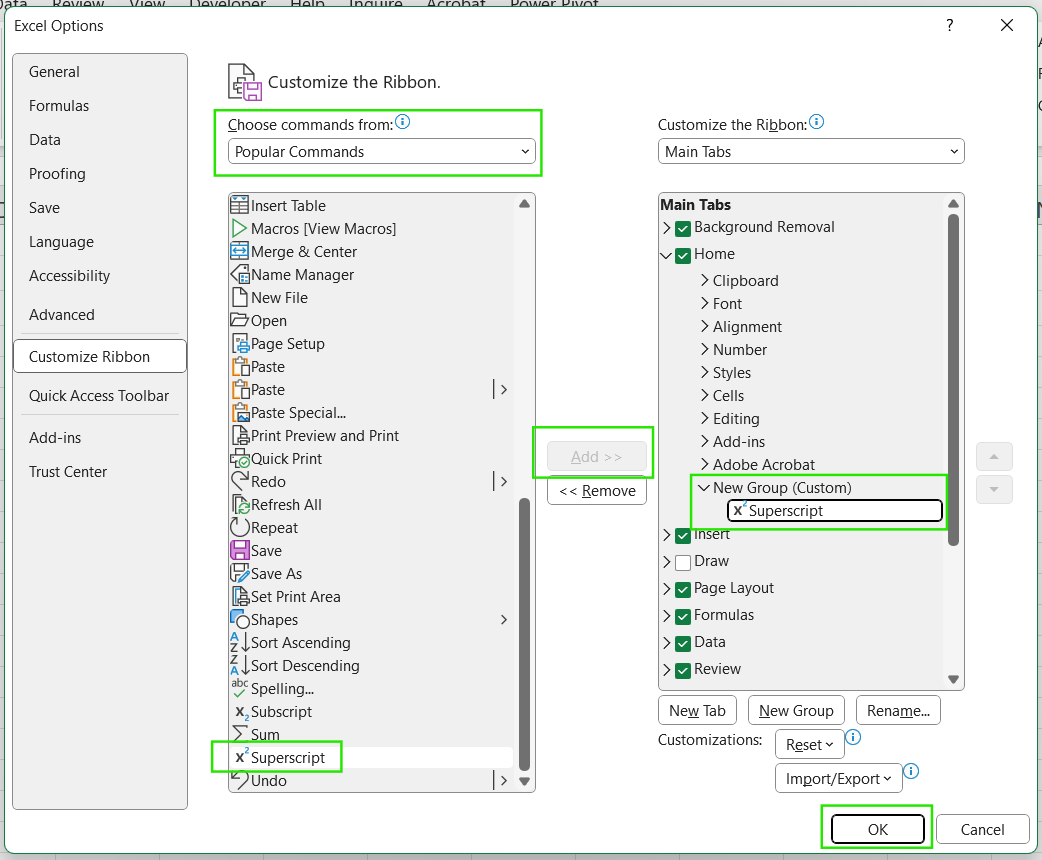
This method creates a permanent home for the superscript command in your Excel interface, making it easily accessible whenever you need it.
Superscripting Numbers in Excel
Superscripting numbers in Excel is more complex than superscripting text because Excel treats numbers differently. Most superscript formatting methods convert numbers to text, affecting how they behave in formulas and calculations. Below are several approaches, each with its strengths and limitations.
Using the Equation Tool
You can insert superscripted numbers via the Equation Tool using these steps:
- Go to Insert in the ribbon.
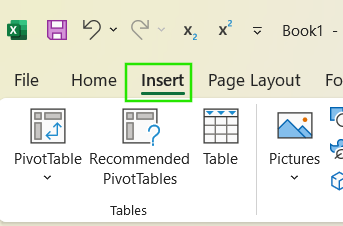
- Select Equation
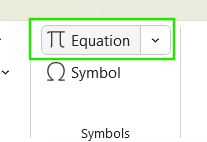
- Select Script, and select the Superscript template. Enter the base and exponent accordingly.
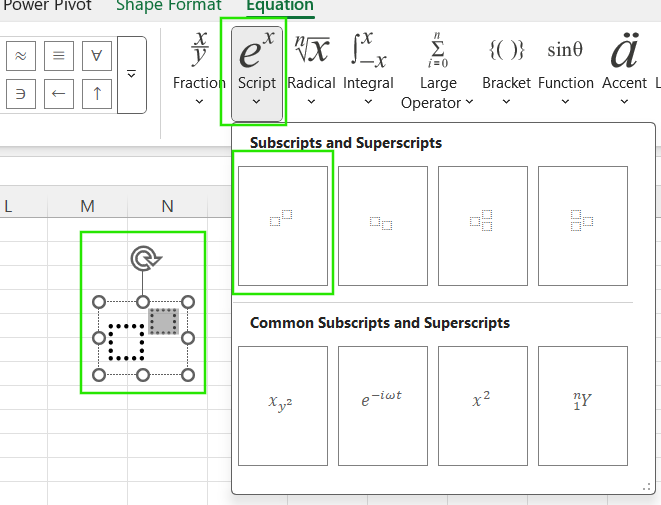
It is important to note that equations are floating objects, not anchored to specific cells, and cannot be used in formulas or calculations; hence, the method is best for presentation purposes only.
Check out our Data Visualization in Excel course to learn more about preparing and visualizing data for presentation in business contexts.
Using Alt Codes (Only 1, 2, 3)
For superscript 1, 2, and 3, use the following Alt codes:
Hold Alt and type:
- 0185 for ¹
- 0178 for ²
- 0179 for ³
Note that the Alt codes only work when Num Lock is enabled and you're using the numeric keypad (not the row of numbers above your letters). If you are using a laptop without a dedicated numeric pad, this may prevent Alt codes from working.
It is also important to note that these characters are font-dependent (work well in fonts like Calibri or Arial) and are treated as text, meaning they cannot be used in numeric calculations.
Using the CHAR() function
You can also append superscripts with the CHAR() function. For example, =A1 & CHAR(178) attaches a superscript 2 to the value in cell A1. However, this method converts the result into a text string, breaking numeric functionality like sorting or math operations.
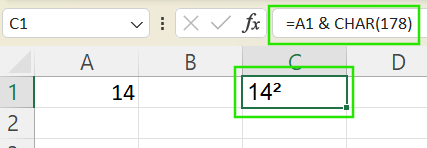
Using custom number formats
To visually display superscripts while retaining the number’s value, use Custom Number Formatting.
-
Select your cells and press Ctrl + 1 to open the Format Cells dialog.
-
Go to the Number tab → Custom.
-
In the Type box, enter a format such as
0².
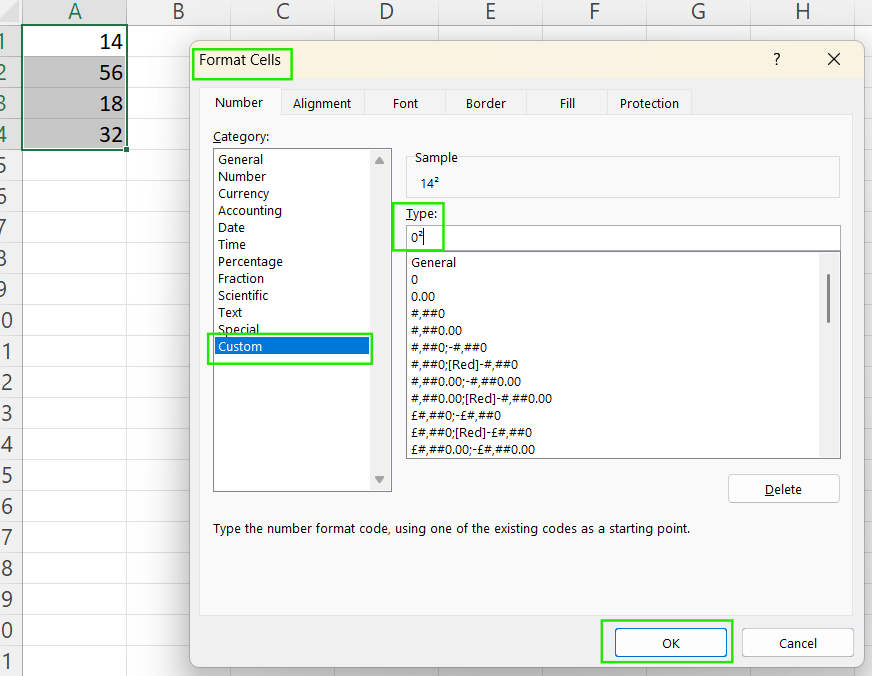
- Click OK to apply.
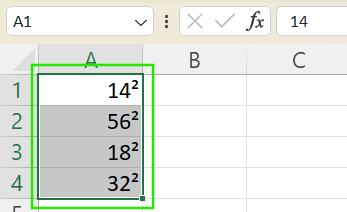
You can copy and paste other superscript characters like ⁴, ⁵, etc., from character maps or the web if not natively supported by your keyboard.
Using VBA for automation
If you need to superscript numbers across a large dataset or automate the process, you can use VBA to automate the operation. Select the required cells, open your VBS editor, and type the following code:
Sub SuperscriptNumbers()
Dim cell As Range
For Each cell In Selection
cell.Value = cell.Value & Chr(178) ' Appends superscript 2
Next cell
End SubThis script appends a superscript 2 to each selected cell. You can modify Chr(178) to other codes as needed.
Limitations and Workarounds
Superscripting in Excel comes with several limitations. These issues include the following:
-
Numeric-to-string conversion: Most methods, like Alt codes and the
CHARfunction, convert numbers to text, breaking calculations unless you reference original values separately. -
Limited character support: Only
¹,², and³have Alt code shortcuts; other superscripts like⁴,⁵, etc. require workarounds. -
Font dependency: Superscripts may display incorrectly in non-standard fonts.
To work around these issues, consider the following practices:
-
Copy-paste Unicode superscripts like
⁰,⁴,⁵,⁶,⁷,⁸,⁹from online sources or character maps. -
You can use the Ink Equation tool to handwrite equations and then convert them to typed superscripts, which is ideal for ad hoc annotations but not formula-friendly.
-
Leverage custom number formats for visual-only superscripts that preserve numeric functionality. For example,
0²displays as1²but retains the value 1. -
Combine methods strategically by using original numeric values in calculations while displaying formatted versions for presentation.
Conclusion
As you have seen, there are several ways to add superscripts in Excel, depending on what you're trying to do. You can use the Equation tool, the CHAR() function, and other methods to add footnotes, units, or math expressions. Some of the methods require a bit more practice than others, but they all work to accomplish superscripting, so you can't go wrong.
I recommend taking our Data Analysis in Excel course to learn about how to generate insights and I recommend our Excel Fundamentals skill track, which I also mentioned earlier, to learn more about the functions available in the latest Excel versions. Or else, our Advanced Excel Functions is a perfect course if you are exploring advanced referencing and lookups.
Advance Your Career with Excel
Gain the skills to maximize Excel—no experience required.
FAQs
How do I apply superscript to text or numbers in Excel?
Select the desired text in a cell, open the Format Cells dialog (Ctrl + 1), go to the Font tab, and check the Superscript box.
Does superscripting affect formulas or calculations?
No. Superscript formatting is purely visual and doesn’t change the actual cell value.
Why don’t Alt codes work on my computer?
Alt codes require the numeric keypad and Num Lock enabled; they may not work on laptops without dedicated keypads.
How can I automate superscripting for many cells?
Use VBA macros to apply superscript characters or formatting across ranges.
What fonts support superscript characters?
Common fonts like Calibri, Arial, and Times New Roman support superscript characters; others may not.

